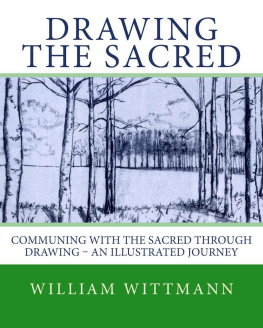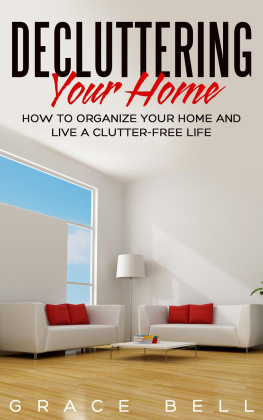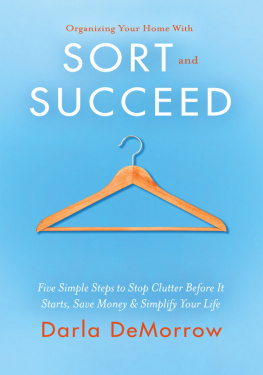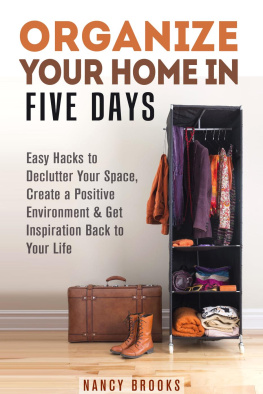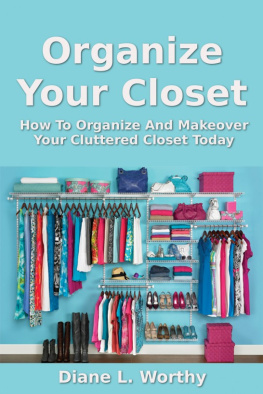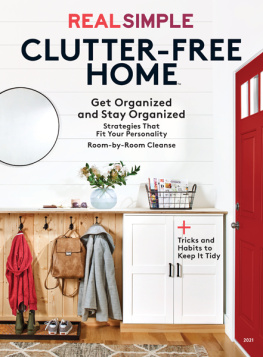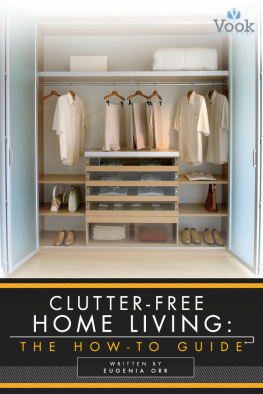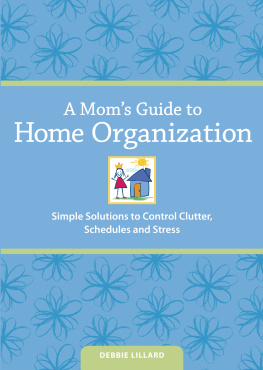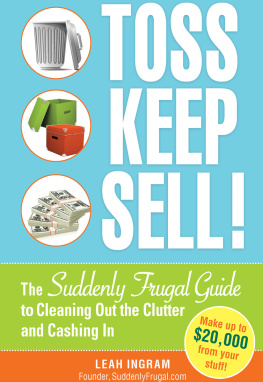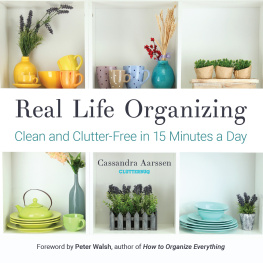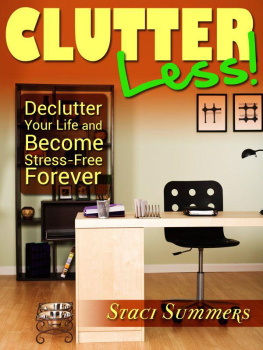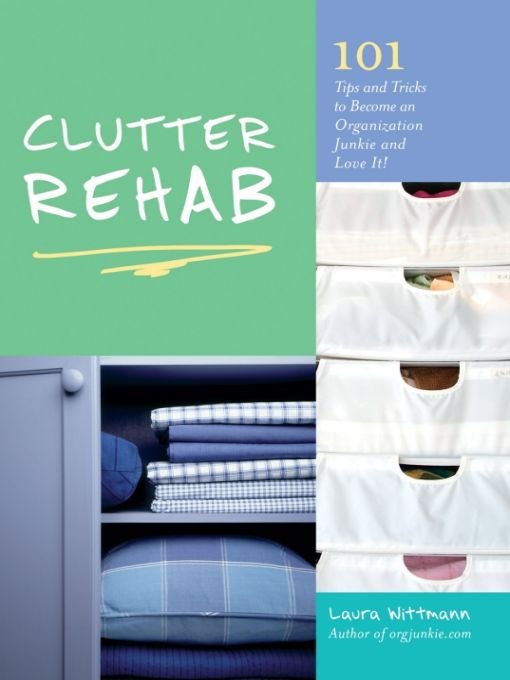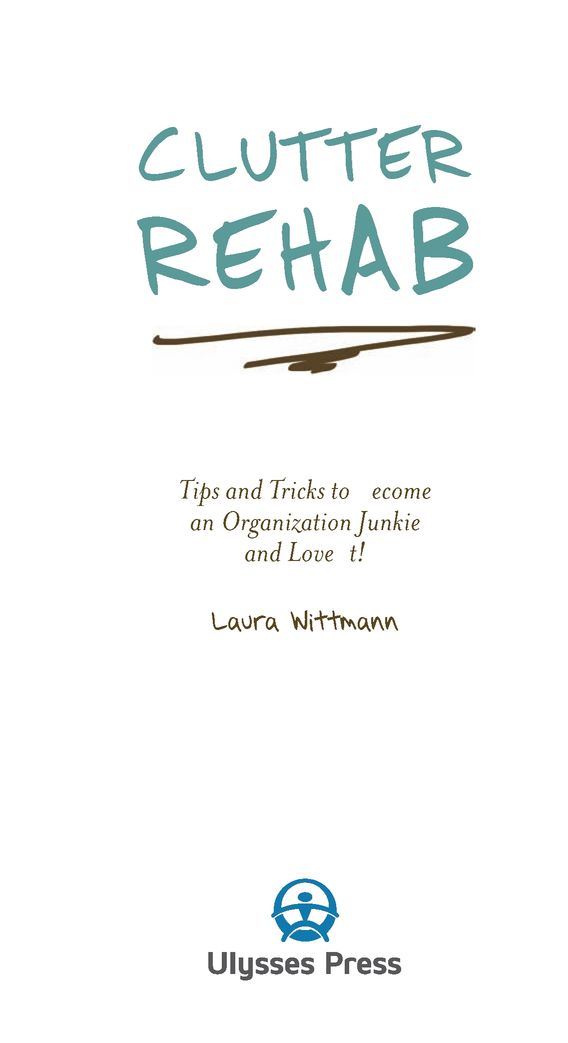Table of Contents
For Miranda, Sarah, Joy and Annie,
my sisters in Christ who believed I could do this
from the very beginning and provided the encouragement,
laughter, and prayer that I needed to pull it off.
Thanks for putting up with my crazy!
Clutter Rehab
LET ME START RIGHT OFF by admitting my little secret: Im an organization addict. Yes, its true! But this doesnt mean I have all my soup cans lined up in pretty little rows with their labels facing out, my spices alphabetized, or perfectly color-coordinated bins and baskets. My sheets arent folded and stacked pristinely, and I dont make my kids sort their Legos by color!
Whats important to me is being organized just enough (notice I didnt say perfectly) so that I can enjoy the rewards of organization without complicating life more than I need to. I avoid stress and chaos as much as possible with strategies that help me eliminate clutter, prepare for lifes little mishaps, save money, and maximize my time so that I can run my household efficiently. This is the freedom that comes from a simplified, organized way of life. Sound impossible?
It isnt! Over the past five years, I have taken a journey toward simplicity and organization and learned some valuable and practical lessons along the way. What started me on my journey? A new baby, a job loss, and a transition to becoming a work-from-home mom, all at the same time. It was overwhelming, to say the least, but it was also what opened my eyes to how out of control my life had become. I just didnt stop to think about how stressed I was. It wasnt until I slowly started the transition to a simpler lifestyle and began introducing some of the changes outlined in this book that I realized how chaotic my life had actually been before. My husband and I made adjustments to how we did things: got the kids involved around the house, scheduled fewer activities, developed simple organizing processes and systems, and, most of all, we reduced our clutter. Believe me, it certainly didnt all happen overnight. Rather, it was a gradual process that continues to this day.
I document my ongoing journey on my blog, Im an Organizing Junkie (www.orgjunkie.com), which I started in 2006 as a way to share this passion of mine with others. As my blog has grown, Ive realized Im not alone in my desire to live an organized life, and nothing makes me happier than the thrill of watching others experience this high of organizing and the life-changing benefits that go along with it. Yet what we all have to remember is that organizing isnt a means to an end, its an ongoing process. Just when you think youve got things all figured out at the top of the ride, the roller coaster of life dips down and spins you in another direction. However, with consistent practice and a good seat belt, youll learn to expect those dips and turns and be ready for them. Youll have strategies and systems in place, not necessarily to prevent lifes curveballs, but to keep you securely fastened so you can go with the flow and maintain your sanity along the way. Organizing is a fun addiction with amazing results and, hopefully, after reading this book, youll be well on your way to becoming an organizing junkie as well. ENJOY THE RIDE!
Lets Talk Clutter
Throughout this book were going to be talking about clutter.
Clutter = Anything you dont love or use or have the space to store
What is it about our stuff that seems to cause it to multiply in the night? Too much stuff and too little space results in clutter. You can either get rid of some stuff or find more space. In my opinion, getting rid of stuff is a lot less expensive and a lot less work than finding more space, especially if that space comes in the form of a storage unit or a bigger house. These are choices we all have to make and, truthfully, clutter is so much more than just the storage solutions needed to contain it. Dealing with clutter requires making some tough decisions on a regular basis.
Clutter = Procrastinated decisions
Its not easy making these decisions because we get attached to our stuff. We fear the consequences of getting rid of something and we wonder if well regret it later, if well lose the memory associated with it, or if well hurt someones feelings. But the truth is this: Clutter is immobilizing. It stifles our freedom to enjoy the spaces we do have, it takes up mental space whether we know it or not, and it can be a huge source of stress and frustration, which then plays itself out in so many other areas of our lives. Making decisions with potential consequences is always hard, but choosing to make no decision at all or putting it off until later when you think the decision-making process is going to be easier isnt going to help you. Stuff doesnt go away on its own; it just continues to pile up.
Luckily, the skills required to deal with our clutter and organize it all are skills anyone can learn. Yes, some of us may be more adept at it, but like anything else, with regular practice, the process gets faster and easier each time. Remember to keep in mind that the goal here is not perfection. The goal is simply to make life easier and more efficient, and to reduce stress (not add to it) by using easily maintained systems that allow for an uncluttered space, an uncluttered mind, and an uncluttered life.
The benefits of letting go of clutter far outweigh the anxiety you feel in the moment.
Believe it can be done! Consider this your clutter rehab, and Im going to teach you how!
Where to start?
I think so many of us look around our spaces and get simply overwhelmed. You know you want to make a change, but arent sure where to start or how to move forward. That feeling can be paralyzing and often leads to procrastination. The straightforward answer to this question is to start small. If you have a whole room needing attention, break the job down into manageable bits. Perhaps you start with just one drawer or the closet. Start with what frustrates you the most. Follow my organizing process below and the tips in this book and youll be well on your way to organizing success. With each accomplishment, revel in what youve achieved! Its a big deal, so be proud and use that as motivation to continue on.
The Organizing PROCESS
Organizing is an ongoing process and not a destination. Just when you think youve got a handle on things, its time to do it all over again. Life happens. Kids outgrow their toys and clothes, your responsibilities and needs change, you have another child, get married, start a new job, and on and on. With the right techniques, however, you can stay on top of these things. You can control your space rather than have your space control you. Being organized allows you to quickly restore the situation when the ride gets a little bumpy.
PROCESS is an easy acronym Ive created to allow you to break down any organizing project into simple, straightforward steps. Using it will help you stick to a plan and achieve optimal organizing results. In fact, by following the PROCESS steps below, anyone can conquer any space of any size. Do one step at a time or all at once, depending on the time you have available for the task.
Here are the PROCESS steps:
Plan of attack: Plan your project before you start. First, evaluate your present system. You need to know what isnt working for you to help you determine how youd like the space to function. Next, set a budget and make a time line. Get clear about how much money and time youre willing to invest before you get started. Definitely dont just jump in blind; youll set yourself up for failure if you do.


